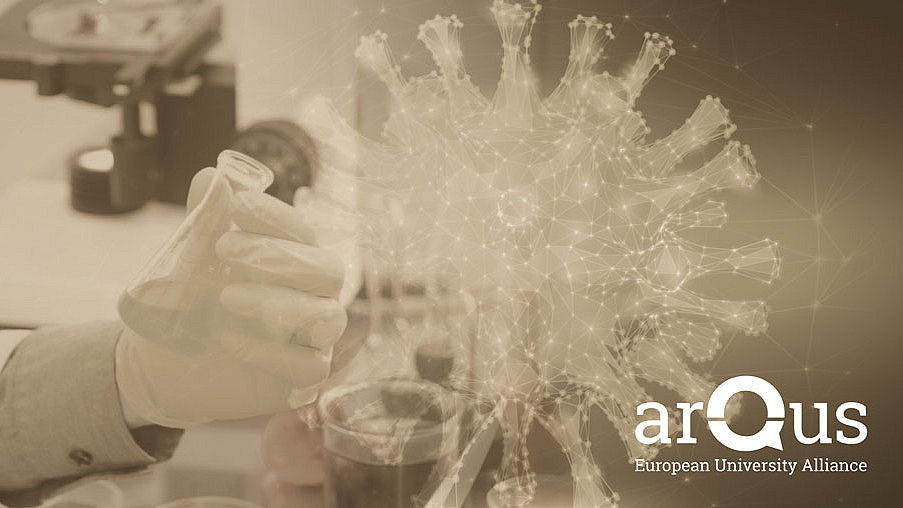It has been nearly 5 months since the pandemic hit Europe back in March and researchers from all over the world are working against the clock to develop a vaccine and to try to understand how the virus works in order to find the best drugs to beat it.
The Arqus universities have been fully committed to helping with the COVID-19 pandemic since the very beginning, offering their staff, materials and premises to help in the diagnosis of possible infections and in the management of the crisis.
After some months, the first funding has started to arrive to our universities, which have received more than €4.5 million for research on COVID-19 topics:
The University of Bergen has received 19.5 million NOK (€1.88 million) in funding for 4 COVID-19 related research projects: COVID-19 in health care workers and the general population; perceived risk and precautions during a pandemic outbreak; cohort study of COVID-19 Nested within an RCT of Patients with Community Acquired Pneumonia: Disease Severity, Management, and Outcomes; SARS-CoV-2 infection and COVID-19 in women and their young infants in Kampala, Uganda.
The University of Granada has received more than €842,000 (29.5% of the total budget) from the Andalusian regional government for 14 projects that will work on providing solutions through the development of tools that improve the diagnosis and treatment of patients affected by COVID-19, as well as on contributing to better understand the etiology and epidemiology of the disease and the public health response required in the context of the current pandemic.
Leipzig University has received a €323,000 from the Saxon State Ministry of Science and Art to study the immune response in SARS-CoV-2 infections and to link specific patterns to the severity of COVID-19 for developing novel diagnostic and prognostic approaches as well as to test potential therapeutic applications. The research project is located at the Faculty for Chemistry and Mineralogy and the Centre for Biotechnology and Biomedicine. The research project is supported by the European Fund for Regional and Structure Development (EFRE, EU, and the Free State of Saxony).
The Université de Lyon distributed €1 million, coming from IDEXLYON, for 16 projects that focus on issues such as the symptoms of the disease, how lockdown affects mental health or how people have learned to cope with the epidemic. There are also studies about the creation of a model based on artificial intelligence to predict patient outcomes as soon as they are admitted to the emergency room, as well as the design of a stand-alone medical device production unit using 3D printing.
Vilnius University and Vilnius University hospital Santaros clinics have received €850,000 for multiple research projects related to SARS-CoV-2 infection diagnostics as well as for investigating the impact that other respiratory illnesses have on patients’ condition other than already known factors such as age, sex and chronic diseases. Other projects would focus on diagnostics from samples taken out of patients’ urine, feces or blood and research to create simplified reagent sets in order to diagnose the virus directly from taken samples without additional steps.
Additionally, both the University of Graz and the University of Padua have launched fundraising campaigns in order to support COVID-19 related research.
In the case of the University of Graz, the aim of their Stop COVID-19 campaign is to find an effective way to prevent the virus from entering human cells with an unconventional therapeutic novel drug.
In the case of the University of Padua, the campaign has been running from the early days of the pandemic and is still open for donations. The fundraising began to bear fruit in May, with the first 4 annual research grants of €25,000 each to support 4 young researchers with projects in different fields. At the time of publication, more than 400 people and institutions had made a donation for the campaign.
Sources:
Marina Fernández-Peña Mollá & Anja Hoffmann
